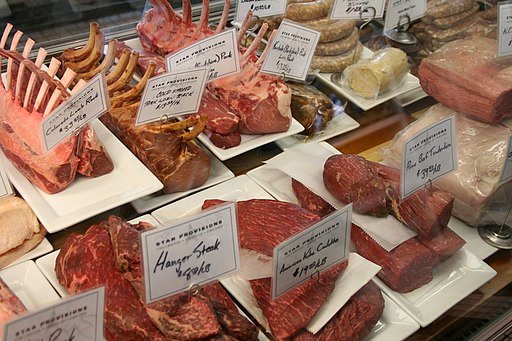
Photo by Nate Steiner. Creative Commons CC0 1.0 Universal Public Domain Dedication.
"I know the Legislature is doing a bill to try to protect our meat," Florida governor Ron DeSantis recently told a college campus audience . "You need meat, OK? And we're going to have meat in Florida. Like, we're not going to have fake meat. Like, that doesn't work."
Florida's legislature is one of several considering bans on the sale of "cultured" or "lab-grown" meat. State legislator Danny Alvarez (R), the bill's sponsor, pretends that it's about food safety: "As of today, the unknowns are so great .... There are no long-term studies."
That's at least more coherent than DeSantis's weird "protecting meat" language, but it's still incorrect. There is one conclusive long-term study. It's called "the history of humankind."
For as long as there have been humans, humans have eaten meat.
And for as long as humans have eaten meat, humans have tried to improve the quality of that meat and get more efficient at producing it. Domestication of animals instead of just eating wild game. Cross-breeding to produce animals that give us more, or better, meat. Different methods of feeding and fattening. Use of antibiotics.
Cultured meat is the next step in that long chain of "improvements.". It produces meat with less need for large herds, big feed lots and pastures, vast quantities of grass and grain, costly transportation of large animals from farm to slaughterhouse to market, etc.
The jury is still out on whether cultured meat will prove commercially viable, becoming available at attractive prices and in attractive forms. But whether it does or not, it's meat. Not "fake" meat. Meat.
For the most part, politicians advocating for a ban are honest about their motives, if you listen closely.
It's not about "protecting meat," whatever that's even supposed to mean.
It's also not about "protecting consumers" from ... well, something. Consumers who like meat can only benefit from more choices that, if things work out, will be cheaper both at point of sale and in terms of economic impact (for example, a bunch of land becoming available for uses other than grazing would likely mean lower housing prices).
It's about protecting one of the most politically powerful and heavily subsidized (but I repeat myself) American industries.
That industry loves to be called "farming," but the better name for it these days is "Big Agriculture."
At one time, most Americans worked in farming. These days, about one in one hundred do. Today's "farms" are highly concentrated factories operated by wealthy multinational corporations, not by stoic peasants in overalls, holding pitchforks or driving tractors, like my grandfather before me and me in my childhood.
Multinational corporations and powerful lobbies don't use politicians to protect consumers. They use politicians to protect themselves from competition at the EXPENSE of consumers.
So now you know who Ron DeSantis and Danny Alvarez really work for, and that it's not you.
The "solution" to the "problem" of cultured meat is to buy it if you want it and not buy it if you don't want it.